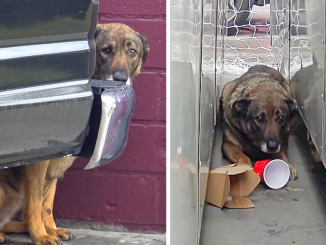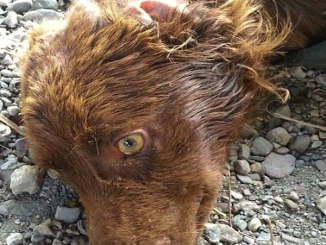Dogs’ brains are sensitive to the familiar high-pitched “cute” voice tone that adult humans, especially women, use to talk to babies, according to a new study.
The research, published recently in the journal Communications Biology, found “exciting similarities” between infant and dog brains during the processing of speech with such a high-pitched tone feature.
Humans tend to speak with a specific speech style characterised by exaggerated prosody, or patterns of stress and intonation in a language, when communicating with individuals having limited language competence.
Such speech has previously been found to be very important for the healthy cognitive, social and language development of children, who are also tuned to such a high-pitched voice.
But researchers, including those from the Eötvös Loránd University in Hungary, hoped to assess whether dog brains are also sensitive to this way of communication.
In the study, conscious family dogs were made to listen to dog, infant and adult-directed speech recorded from 12 women and men in real-life interactions.
As the dogs listened, their brain activities were measured using a functional magnetic resonance imaging (fMRI) scan.
The study found the sound-processing regions of the dogs’ brains responded more to dog- and infant-directed than adult-directed speech.
This marked the first neurological evidence that dog brains are tuned to speech directed specifically at them.
“Studying how dog brains process dog-directed speech is exciting, because it can help us understand how exaggerated prosody contributes to efficient speech processing in a nonhuman species skilled at relying on different speech cues,” explained Anna Gergely, co-first author of the study.
Scientists also found dog- and infant-directed speech sensitivity of dog brains was more pronounced when the speakers were women, and was affected by voice pitch and its variation.
These findings suggest the way we speak to dogs matters, and that their brain is specifically sensitive to the higher-pitched voice tone typical to the female voice.
“Remarkably, the voice tone patterns characterizing women’s dog-directed speech are not typically used in dog-dog communication – our results may thus serve evidence for a neural preference that dogs developed during their domestication,” said Anna Gábor, co-first author of the study.
“Dog brains’ increased sensitivity to dog-directed speech spoken by women specifically may be due to the fact that women more often speak to dogs with exaggerated prosody than men,” Dr Gabor said.

“Homeless but Not Alone: Dog’s Devotion to Owner Warms Hearts Amidst Difficult Circumstances”

In the bustling heart of the city, where the rhythm of life beats loudly and the struggles of the less fortunate are often drowned out by the urban cacophony, there exists an extraordinary bond between a homeless man and his faithful canine companion, a bond that has touched the hearts of millions.
Meet Jack, a man who fell through the cracks of society, finding himself without a home, without comfort, and without hope. His days were filled with uncertainty, and his nights were spent seeking refuge wherever he could find it. But amidst the harsh realities of life on the streets, there was one constant source of solace and unwavering love – his loyal dog, Buddy.
Buddy, a scrappy yet endearing mixed breed, became Jack’s lifeline in the sea of despair. Their story was not just one of a man and his pet; it was a testament to the transformative power of companionship and unconditional love. Despite the dire circumstances they faced, Buddy remained by Jack’s side, offering him warmth on cold nights and companionship in moments of solitude.

As the seasons changed and years passed, Jack and Buddy’s story began to spread. News of their unwavering bond traveled through the city, resonating with the hearts of compassionate individuals who were moved by their plight. Communities came together, offering support in various forms – warm meals, blankets, and, most importantly, a glimmer of hope. Their tale became a symbol of resilience, teaching people that love knows no bounds, transcending social status, and reminding us all of the simple, yet profound, joy that a loyal companion can bring.
One winter, as the city was blanketed in snow, a local shelter took notice of Jack and Buddy’s story. Touched by their unwavering companionship, they offered Jack a place to stay, a warm bed, and a fresh start. Jack was hesitant at first, reluctant to leave the only life he knew, but he realized that this opportunity could provide a better future not just for him but also for Buddy.

The transition from the streets to a shelter was not without its challenges. Jack, unused to the structured environment, struggled to adapt. Yet, through it all, Buddy remained his steadfast anchor, his furry confidant who provided comfort in the face of change. With the support of the shelter’s dedicated staff and volunteers, Jack began to rebuild his life. He attended counseling sessions, acquired new skills, and slowly regained his confidence.
Buddy, too, flourished in this new environment. He became a beloved presence within the shelter, bringing smiles to the faces of residents and staff alike. His wagging tail and playful antics served as a reminder of the transformative power of love, inspiring others to adopt pets and foster the same bond that he shared with Jack.

The tale of Jack and Buddy reached far beyond the confines of the shelter and the city. News outlets picked up their story, and soon, they became a symbol of hope for the homeless community worldwide. Donations poured in to support shelters and organizations dedicated to helping both people and their pets, reinforcing the idea that no one should ever be without a home, human or otherwise.
Their journey was not without its challenges, but it was a testament to the enduring power of love, friendship, and second chances. Jack and Buddy’s story became a beacon of hope, illuminating the darkest corners of society and reminding us all that compassion and empathy can transform lives.

As the years passed, Jack found stable employment and eventually secured a modest home. Buddy, now a senior dog, continued to be his faithful companion, reminding him daily of the resilience they shared and the unwavering bond that had stood the test of time. Together, they visited schools and shelters, sharing their story and inspiring others to never lose hope, no matter how dire their circumstances might seem.
In the end, the tale of Jack and Buddy became more than just a story; it became a legacy, a reminder etched into the hearts of millions, urging them to see the humanity in every individual, regardless of their situation. Their journey served as a powerful testament to the enduring strength of the human spirit and the extraordinary capacity of animals to bring comfort, joy, and love into our lives.

And so, in the quiet moments of reflection, as Jack looked into Buddy’s loyal eyes, he knew that their story was not just their own – it was a beacon of light that had shone brightly, guiding others out of the darkness and into the embrace of compassion, understanding, and love. Together, they had taught the world that even in the face of adversity, the bond between a man and his dog could ignite a spark of hope, illuminating the path toward a brighter, more compassionate future for all.



Leave a Reply